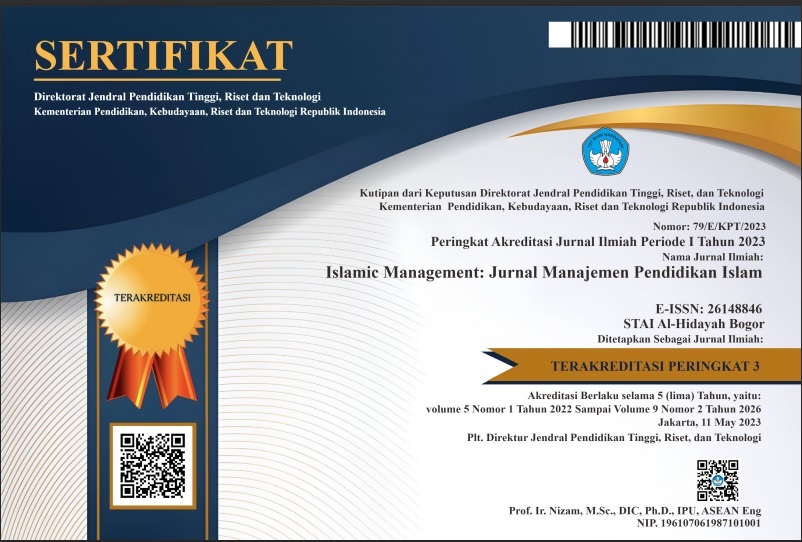TEACHER PROFESSIONAL COMPETENCY DEVELOPMENT MANAGEMENT AT MAS AL-WASHLIYAH 22 MEDAN TEMBUNG
DOI:
https://doi.org/10.30868/im.v7i02.6199Keywords:
Teacher, Professional Competency, Management, DevelopmentAbstract
This research aims to analyze the management of teacher professional competency development at MAS Al-Washliyah 22 Tembung. This research is a type of qualitative research using a descriptive approach. This research was carried out through a qualitative approach using descriptive methods. Data collection using interviews, observation and documentation studies. Data sources are madrasa principals, deputy principals and teachers. Data analysis with data categorization, data interpretation. The research results concluded that first, planning for the development of teacher professional competence has not been contained in strategic plans, operational plans and activity plans, where development activities are still in the form of training and supervision activities. Second, the policy for developing teacher professional competence is also still in the information stage. The policy has not been directed towards training and supervision policies. Third, the implementation of teacher professional competency development begins in February-May in the form of supervision of teaching implementation by the head of the madrasah, while it is carried out by external madrasahs, namely in February-November of the new school year in the form of training from the Madrasah KSKK Directorate which takes part in 15 people while e- Guru.id and the Ministry of Religion have not yet had any teachers participate. Fourth, evaluation of teacher professional competency development is carried out during training only by conveying warnings about the importance of training, while evaluation during supervision is carried out through face-to-face evaluation with each teacher in the field of study and evaluation at work meetings.
References
Arifin, A. (2017). Upaya Diri Menjadi Guru Profesional. Bandung: Alfabeta.
Assingkily, M. S. (2021). Metode Penelitian Pendidikan: Panduan Menulis Artikel Ilmiah dan Tugas Akhir. Yogyakarta: K-Media.
Badrudin, B., & Ruswandi, U. (2010). Pengembangan Kepribadian Guru. Bandung: CV. Insan.
Bagou, D. Y., & Suking, A. (2020). “Analisis Kompetensi Profesional Guru†Jambura Journal of Educational Management, 1(1). https://ejournal-fip-ung.ac.id/ojs/index.php/JJEM/article/view/522.
Bahri, S. (2014). “Supervisi Akademik dalam Peningkatan Profesionalisme Guru†Visipena, 5(1). https://ejournal.bbg.ac.id/visipena/article/view/236.
Danim, S. (2011). Profesi Guru: Dipuji, Dikritis, dan Dicaci. Jakarta: RajaGrafindo Persada.
Dudung, A. (2018). “Kompetensi Profesional Guru†JKKP: Jurnal Kesejahteraan Keluarga dan Pendidikan, 5(1). http://journal.unj.ac.id/unj/index.php/jkkp/article/view/6451.
Helmi, J. (2015). “Kompetensi Profesionalisme Guru†Al-Ishlah: Jurnal Pendidikan, 7(2). http://www.journal.staihubbulwathan.id/index.php/alishlah/article/view/43.
Hermawan, I., Supiana, S., & Zakiah, Q. Y. (2020). “Kebijakan Pengembangan Guru di Era Society 5.0†JIEMAN: Journal of Islamic Educational Management, 2(2). https://jieman.uinkhas.ac.id/index.php/jieman/article/view/33.
Idris, I. (2020). “Kajian Kebijakan Peningkatan Profesionalisme Guru dan Dosen di Indonesia†Guru Tua: Jurnal Pendidikan dan Pembelajaran, 3(2). https://unisa-palu.e-journal.id/gurutua/article/view/57.
Kristiawan, M., & Rahmat, N. (2018). “Peningkatan Profesionalisme Guru Melalui Inovasi Pembelajaran†Jurnal Iqra’: Kajian Ilmu Pendidikan, 3(2). https://journal.iaimnumetrolampung.ac.id/index.php/ji/article/view/348.
Lestari, D. I., & Kurnia, H. (2023). “Implementasi Model Pembelajaran Inovatif untuk Meningkatkan Kompetensi Profesional Guru di Era Digital†JPG: Jurnal Pendidikan Guru, 4(3). https://ejournal.uika-bogor.ac.id/index.php/jpg/article/view/14252.
Mudarris, B. (2022). “Profesionalisme Guru di Era Digital: Upaya dalam Meningkatkan Mutu Lembaga Pendidikan†ALSYS, 2(6). https://ejournal.yasin-alsys.org/index.php/alsys/article/view/640.
Mulyawan, B. (2012). “Pengaruh Pengalaman dalam Pelatihan Terhadap Peningkatan Kompetensi Profesional Guru†Media Komunikasi FPIPS, 11(1). https://ejournal.undiksha.ac.id/index.php/MKFIS/article/view/453.
Novelita, N., Devian, L., Sufyarma, S., & Rifma, R. (2023). “Strategi Pengembangan Profesionalisme Guru dalam Konteks Manajemen Berbasis Sekolah Dasar di Era Digital†MODELING: Jurnal Program Studi PGMI, 10(3). http://www.jurnal.stitnualhikmah.ac.id/index.php/modeling/article/view/1673.
Ramadhani, S. P., & Zulela, M. S. (2020). “Profesional Pedagogy Guru Terhadap Perubahan Pembelajaran di Era Digital†Jurnal Elementaria Edukasia, 3(2). https://www.academia.edu/download/78574655/2008.pdf.
Rismawati, B. V., Arif, M., & Mahfud, M. (2021). “Strategi Madrasah Ibtidaiyah dalam Meningkatkan Profesionalisme Guru Kelas di Era Revolusi Industri 4.0†Elementeris: Jurnal Ilmiah Pendidikan Dasar Islam, 3(1). http://jim.unisma.ac.id/index.php/je/article/view/10538.
Riyadin, S. (2016). “Kebijakan Pengembangan Profesionalisme Berkelanjutan Guru PNS†JKMP: Jurnal Kebijakan dan Manajemen Publik, 4(2). https://jkmp.umsida.ac.id/index.php/jkmp/article/view/1644.
Saerang, H. M., Lembong, J. M., Sumual, S. D. M., & Tuerah, R. M. S. (2023). “Strategi Pengembangan Profesionalisme Guru di Era Digital: Tantangan dan Peluang†El-Idare: Jurnal Manajemen Pendidikan Islam, 9(1). https://openrecruitment.radenfatah.ac.id/index.php/El-idare/article/view/16555.
Sagala, S. (2011). Kemampuan Profesional Guru dan Tenaga Kependidikan. Bandung: Alfabeta.
Siswanto, H. (2018). “Pengembangan Kompetensi Profesional Guru Melalui Kebijakan Sertifikasi†Madinah: Jurnal Studi Islam, 5(2). http://ejournal.iai-tabah.ac.id/index.php/madinah/article/view/1276.
Suparlan, S. (2008). Guru Sebagai Profesi. Yogyakarta: Hikayat Publishing.
Wibowo, A. (2013). Manajemen Pendidikan Karakter di Madrasah. Yogyakarta: Pustaka Pelajar.
Yunus, M. (2016). “Profesionalisme Guru dalam Peningkatan Mutu Pendidikan†Lentera Pendidikan: Jurnal Ilmu Tarbiyah dan Keguruan, 19(1). https://journal3.uin-alauddin.ac.id/index.php/lentera_pendidikan/article/view/2074.
Downloads
Published
How to Cite
Issue
Section
Citation Check
License
Copyright (c) 2024 Islamic Management: Jurnal Manajemen Pendidikan Islam

This work is licensed under a Creative Commons Attribution-ShareAlike 4.0 International License.
Authors who publish with this journal agree to the following terms:
- Authors retain copyright and grant the journal right of first publication with the work simultaneously licensed under a Creative Commons Attribution License that allows others to share the work with an acknowledgment of the work's authorship and initial publication in this journal.
- Authors are able to enter into separate, additional contractual arrangements for the non-exclusive distribution of the journal's published version of the work (e.g., post it to an institutional repository or publish it in a book), with an acknowledgment of its initial publication in this journal.
- Authors are permitted and encouraged to post their work online (e.g., in institutional repositories or on their website) prior to and during the submission process, as it can lead to productive exchanges, as well as earlier and greater citation of published work (See The Effect of Open Access).






